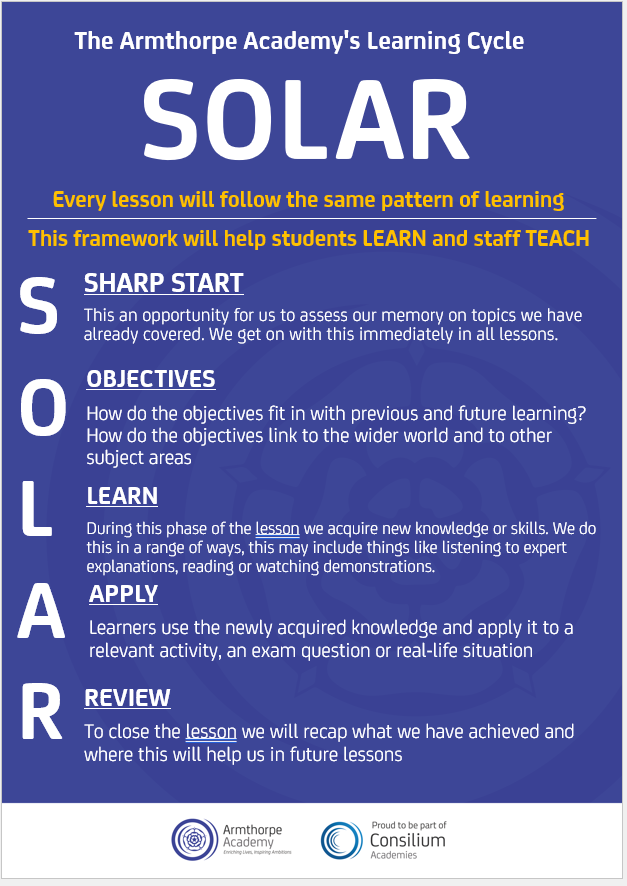Teaching and Learning
The SOLAR Learning Cycle
All lessons at Armthorpe Academy follow the SOLAR learning cycle.

Supporting Student Success through Retrieval Practice
At Armthorpe Academy, we are committed to providing a high-quality education that prepares every student for academic success and life beyond the classroom. One of the keyways we support this vision is through the use of retrieval practice, a proven learning strategy that helps students remember more, for longer.
Retrieval practice is the act of recalling information from memory, rather than simply re-reading or reviewing. Studies show that regularly retrieving information strengthens memory, improves understanding, and increases students’ ability to apply knowledge in different contexts. With exams requiring students to recall content from multiple topics and years of study, strong retrieval skills are essential.
To embed this approach across the school, we have introduced two initiatives: Experts of Recall and Recall it All.
Experts of Recall: Weekly Knowledge Checks
Each week, students across all year groups complete short, low-stakes quizzes designed to revisit and reinforce what they’ve previously learned. These quizzes contain a small number of questions, which increase in complexity to encourage deeper thinking. Rather than testing for grades, these activities are about practice—helping students build confidence in what they know and giving teachers valuable insight into where support may be needed.
This regular recall helps prevent forgetting, strengthens understanding over time, and encourages independent study habits. It's a simple but powerful way to make learning stick.
Recall it All/40 Minute Mock: Strengthening Exam Readiness
For students in Key Stage 3 (Years 7–9), we have introduced more formal assessments called Recall it All. These take place several times a year and mirror the style of real exams, with a broader range of questions drawn from across the curriculum. This helps students consolidate their learning, spot gaps in their knowledge, and get used to the type of thinking required in longer assessments.
At Key Stage 4 (Years 10–11), we also run regular 40-minute mock exams to prepare students for the demands of their final GCSEs. These shorter exams are designed to build stamina, reduce exam anxiety, and give students repeated opportunities to improve their technique and performance.
Why This Matters
By helping students practise recalling information regularly, we are giving them the tools to succeed not just in exams, but in any situation where they need to think clearly and remember under pressure. These strategies are grounded in research and reflect our commitment to giving students the very best teaching and learning experience.
We are proud to be developing learners who are confident, independent, and ready for the challenges ahead. Thank you for supporting us in this journey
